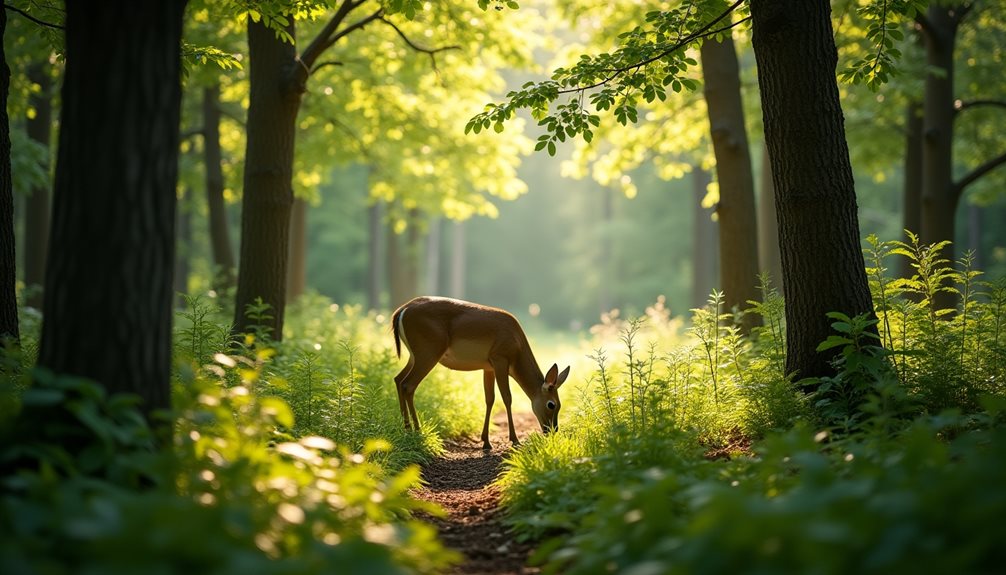Table of Contents
ToggleImportance of Vocabulary in Environmental Conservation – (Важность словаря в охране окружающей среды)

Although often overlooked, vocabulary plays an essential role in environmental conservation, as it shapes the discourse surrounding forestry and wildlife management.
Precise terminology facilitates effective conservation communication, enabling stakeholders to articulate complex issues clearly. This clarity is fundamental for bridging language barriers that may hinder collaboration among diverse groups, including scientists, policymakers, and local communities.
A shared vocabulary fosters mutual understanding and empowers individuals to advocate for sustainable practices. In addition, an enriched lexicon enhances public engagement, allowing broader audiences to connect with conservation efforts.
When learning Russian, especially on a topic like environmental conservation, having the right vocabulary is crucial. It helps you understand, discuss, and participate in conversations about nature, forests, wildlife, and sustainability. Let’s expand on why vocabulary matters and learn some related Russian words.
Why Vocabulary is Important in Environmental Conservation
- Clear Communication
Using precise words helps people talk about complicated environmental topics clearly. For example, words like “forest” or “wildlife” describe very specific things. If everyone understands these words the same way, it’s easier to work together. - Bridging Language Gaps
Environmental conservation often involves people from different countries and backgrounds. Knowing the right Russian terms helps English speakers communicate with Russian speakers effectively, whether scientists, government workers, or local communities. - Empowering Advocacy
When you know the right words in Russian, you can explain why protecting the environment is important and encourage others to take action. - Public Engagement
Using understandable vocabulary helps more people get interested in conservation efforts, making the movement stronger.
Useful Russian Vocabulary for Environmental Conservation
| Russian (Cyrillic) | English Phonetic | English Definition |
|---|---|---|
| экология | ekológiya | ecology |
| окружающая среда | okrúzhayushchaya sréda | environment |
| охрана | okhrána | protection, conservation |
| лес | les | forest |
| дикая природа | dikáya príroda | wildlife |
| устойчивое развитие | ustóychivoe razvítiye | sustainable development |
| загрязнение | zagryaznéniye | pollution |
| климатические изменения | klimatícheskiye izmenéniya | climate change |
| биоразнообразие | bioraznobráziye | biodiversity |
| природные ресурсы | prírodnyye resúrsy | natural resources |
| защита природы | zashchíta prírody | nature protection |
| сохранение | sokhráneniye | preservation |
![]()
Example Sentences in Russian with Translation
- Русский: Охрана лесов очень важна для сохранения биоразнообразия.
- Phonetic: Okhrána lesov óchen’ vázhna dlya sokhráneniya bioraznobráziya.
- English: Forest protection is very important for preserving biodiversity.
- Русский: Климатические изменения влияют на окружающую среду.
- Phonetic: Klimatícheskiye izmenéniya vliyáyut na okrúzhayushchuyu srédu.
- English: Climate changes affect the environment.
Knowing these words and phrases will help you better understand environmental topics in Russian and communicate your ideas clearly. It also connects you with a global conversation about protecting our planet.
Basic Forestry Terms — Основные термины лесоводства
Forestry encompasses a range of specialized terms that are fundamental for effective communication within the field.
Key concepts include “tree management” (управление деревьями [upravleniye derev’yami]), which refers to the practices aimed at maintaining and enhancing the liveliness and productivity of trees in a given area. This involves techniques like thinning, pruning, and planting to optimize growth and health.
Another essential term is “forest health” (здоровье леса [zdorov’ye lesa]), which pertains to the overall condition of a forest ecosystem, including biodiversity, soil quality, and resilience to pests and diseases.
Understanding these basic forestry terms enables professionals and enthusiasts alike to engage in meaningful discussions about sustainable practices.
Mastery of this vocabulary ultimately supports efforts in promoting conservation and responsible stewardship of forest resources.
Here is a list of important Russian forestry terms with English pronunciation and definitions to help you learn vocabulary related to forestry.
| Russian (Cyrillic) | English Phonetic | English Definition |
|---|---|---|
| Лесоводство | Lesovodstvo | Forestry — the science and practice of managing forests |
| Дерево | Derevo | Tree — a woody plant with a trunk and branches |
| Управление деревьями | Upravleniye derevyami | Tree management — practices to maintain and improve trees |
| Прореживание | Proryezhiwanie | Thinning — removing some trees to improve growth of others |
| Обрезка | Obrezka | Pruning — cutting branches to promote healthy growth |
| Посадка деревьев | Posadka derevyev | Planting trees — putting new trees in the soil |
| Здоровье леса | Zdorovye lesa | Forest health — overall condition of a forest ecosystem |
| Биологическое разнообразие | Biologicheskoye raznoobraziye | Biodiversity — variety of life in the forest |
| Почва | Pochva | Soil — top layer of earth where plants grow |
| Устойчивость | Ustoychivost | Resilience — ability to recover from damage |
| Вредители | Vrediteli | Pests — insects or animals harmful to plants |
| Болезни | Bolezni | Diseases — illnesses affecting trees and plants |
| Сохранение | Sokhraneniye | Conservation — protection and care of natural resources |
| Ответственное управление лесами | Otvetstvennoye upravleniye lesami | Responsible forest management — careful use of forests to keep them healthy |
![]()
Phrases for Engaging Local Communities
Engaging local communities in wildlife conservation efforts is essential for fostering stewardship and sustainable practices. Effective phrases that promote community engagement and local collaboration can bridge the gap between conservationists and residents. These phrases can empower communities, emphasizing shared goals and responsibilities.
| Phrase | Emotion Evoked | Purpose |
|---|---|---|
| “Together for our future” (Вместе для нашего будущего / Vmeste dlya nashego budushchego) | Unity and hope | Encourages collective action |
| “Your voice matters” (Твой голос важен / Tvoy golos vazhen) | Empowerment | Validates local input |
| “Protecting our heritage” (Защита нашего наследия / Zashchita nashego naslediya) | Pride and belonging | Connects conservation to culture |
Terms Related to Ecosystems and Biodiversity (Термины, связанные с экосистемами и биоразнообразием)
Community involvement in conservation not only strengthens local ties but also enhances understanding of the ecosystems and biodiversity that underpin these efforts.
Recognizing the importance of ecosystem dynamics is essential for effective conservation strategies. This concept encompasses the interactions between living organisms and their environments, influencing species distribution and ecological balance.
Additionally, biodiversity hotspots, areas rich in endemic species, are fundamental for preserving global biodiversity. These regions face significant threats from human activity, making targeted conservation efforts critical.
By fostering community engagement, stakeholders can promote awareness of these important terms and their implications, ensuring that conservation initiatives are not only scientifically informed but also culturally relevant.
This synergy between local knowledge and ecological science is significant in advancing conservation goals.
| Russian (Cyrillic) | English Phonetic | English Definition |
|---|---|---|
| Экосистема | Ekosistema | Ecosystem: A community of living organisms interacting with their physical environment. |
| Биологическое разнообразие | Biologicheskoye raznoobraziye | Biodiversity: The variety of life in the world or in a particular habitat or ecosystem. |
| Сообщество | Soobshchestvo | Community: A group of different species living together in one area. |
| Охрана природы | Okhrana prirody | Conservation: The protection and preservation of natural environments and wildlife. |
| Вид | Vid | Species: A group of living organisms consisting of similar individuals capable of exchanging genes. |
| Эндемик | Endemik | Endemic species: Species that are native to a particular area and found nowhere else. |
| Горячая точка биоразнообразия | Goryachaya tochka bioraznoobraziya | Biodiversity hotspot: A region with a high level of endemic species that is under threat. |
| Взаимодействие | Vzaimodeystviye | Interaction: The way living organisms affect each other and their environment. |
| Экологический баланс | Ekologicheskiy balans | Ecological balance: A stable state in an ecosystem where species coexist without harming the environment. |
| Угрозы | Ugrozy | Threats: Factors that endanger ecosystems or species, often caused by human activity. |
| Местное знание | Mestnoye znaniye | Local knowledge: Understanding and practices developed by local communities about their natural environment. |
| Сохранение | Sokhraneniye | Preservation: The act of maintaining natural habitats and species to prevent loss or damage. |
| Инициатива | Initsiativa | Initiative: A new plan or action aimed at solving a problem, such as conservation efforts. |
![]()
Legal and Policy Vocabulary in Conservation

While the interplay between legal frameworks and conservation efforts is often complex, understanding the specific vocabulary related to legal and policy aspects is essential for effective environmental governance. Key terms encompass various dimensions of law and policy, influencing conservation strategies and implementation. This knowledge aids environmentalists in maneuvering through the intricacies of legal systems and understanding policy
| Term | Definition | Importance |
|---|---|---|
| “Conservation Law” (Закон охраны природы, Zakon okhrany prirody) |
Legislation aimed at protecting natural resources | Guides legal actions and policies |
| “Regulatory Framework” (Регулятивная структура, Regulyativnaya struktura) |
Set of rules governing conservation practices | Guarantees compliance and accountability |
| “Policy Analysis” (Анализ политики, Analiz politiki) |
Assessment of policies affecting conservation | Informs decision-making processes |
| “Environmental Impact Assessment” (Оценка воздействия на окружающую среду, Otsenka vozdeystviya na okruzhayushchuyu sredu) |
Evaluation of potential environmental effects | Mandatory for project approvals |
| “Sustainable Development” (Устойчивое развитие, Ustoychivoe razvitie) |
Development that meets current needs without compromising future generations | Balances ecological integrity with economic growth |
![]()
Test Yourself on Forestry and Wildlife Conservation Vocabulary in Russian
1. What is the correct Russian term for “forest health,” meaning the overall condition of a forest ecosystem?
a) Управление деревьями (Upravleniye derevyami)
b) Здоровье леса (Zdorovye lesa)
c) Прореживание (Proryezhiwanie)
Correct answer: b) Здоровье леса (Zdorovye lesa)
2. How do you say “biodiversity” in Russian, referring to the variety of life in a particular habitat or ecosystem?
a) Биологическое разнообразие (Biologicheskoye raznoobraziye)
b) Экосистема (Ekosistema)
c) Устойчивое развитие (Ustoychivoe razvitie)
Correct answer: a) Биологическое разнообразие (Biologicheskoye raznoobraziye)
3. Which phrase means “Together for our future” and is used to encourage community involvement in conservation?
a) Твой голос важен (Tvoy golos vazhen)
b) Вместе для нашего будущего (Vmeste dlya nashego budushchego)
c) Защита нашего наследия (Zashchita nashego naslediya)
Correct answer: b) Вместе для нашего будущего (Vmeste dlya nashego budushchego)
Frequently Asked Questions
How Can I Improve My Russian Language Skills for Conservation?
To enhance Russian language skills for conservation, one might engage in language exchange programs and utilize vocabulary flashcards. These methods can facilitate practical communication and reinforce essential terminology, ultimately enriching the learner’s understanding and application in conservation contexts.
Are There Online Courses for Forestry Vocabulary in Russian?
The availability of online forestry courses provides an opportunity to enhance Russian vocabulary resources. Such courses often focus on terminology relevant to environmental science, aiding learners in acquiring essential language skills for effective communication in conservation efforts.
What Are Common Mistakes When Translating Conservation Terms Into Russian?
Common mistakes in translating conservation terms into Russian often stem from translation pitfalls and terminology discrepancies, leading to misunderstandings. Accurate contextual understanding is essential to convey the intended message effectively, ensuring clarity in environmental communication.
How Can I Practice Speaking About Conservation in Russian?
To practice speaking about conservation in Russian, one can utilize role playing dialogues to simulate conversations, alongside vocabulary flashcards that reinforce key terms, thereby enhancing fluency and comprehension in environmental discussions within the language.
Are There Russian-Language Resources for International Conservation Efforts?
The availability of Russian-language resources for international conservation efforts is notable, with various conservation organizations fostering international partnerships. These resources enhance communication and collaboration, essential for addressing global environmental challenges effectively and promoting sustainable practices.



